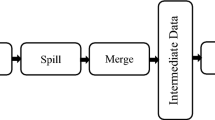Abstract
This article presents a set of linear regression models to predict the impact of task migration on different objectives, like performance and energy consumption. It allows to establish whether at a given moment the migration of a task is profitable in terms of performance or energy consumption. Also, it can be used to determine the best node to migrate a task depending on the objective. The model uses a small set of parameters that are easily measurable. It has been validated against a small heterogeneous cluster using the Slurm resource manager. The model captures the tendencies observed in the results of the experiments, with average relative errors below 3.5% in execution time and 2.5% in energy consumption.





Similar content being viewed by others
Notes
The code is available at https://github.com/dmtcp.
References
Petri S, Langendörfer H (1995) Load balancing and fault tolerance in workstation clusters migrating groups of communicating processes. SIGOPS Oper Syst Rev 29(4):25–36
Harchol-Balter M, Downey AB (1997) Exploiting process lifetime distributions for dynamic load balancing. ACM Trans Comput Syst 15(3):253–285
Milojičić DS, Douglis F, Paindaveine Y, Wheeler R, Zhou S (2000) Process migration. ACM Comput Surv 32(3):241–299
Simon P, Stefan L, Antonello M, Carsten C, Jens B (2016) Application migration in HPC—a driver of the exascale era? Int Conf High Perform Comput Simul HPCS 2016:318–325
Jiang Y (2016) A survey of task allocation and load balancing in distributed systems. IEEE Trans Parallel Distrib Syst 27(2):585–599
Laredo JLJ, Guinand F, Olivier D, Bouvry P (2017) Load balancing at the edge of chaos: how self-organized criticality can lead to energy-efficient computing. IEEE Trans Parallel Distrib Syst 28(2):517–529
Gladys U, Montse F, Jordi F (2017) Task packing: getting the best from MPI unbalanced applications. In: Proceedings—2017 25th Euromicro International Conference on Parallel, Distributed and Network-Based Processing, PDP 2017, pp 547–550
De Ivanoe F, Eryk L, Richard O, Umberto S, Ernesto T, Marek T (2018) Effective processor load balancing using multi-objective parallel extremal optimization. In: Proceedings of the Genetic and Evolutionary Computation Conference Companion, GECCO ’18, pp 1292–1299, New York, NY, USA, ACM
El-Sayed N, Schroeder B (2018) Understanding practical tradeoffs in hpc checkpoint-scheduling policies. IEEE Trans Dependable Secur Comput 15(2):336–350
Bosque JL, Toharia P, Robles OD, Pastor L (2013) A load index and load balancing algorithm for heterogeneous clusters. J Supercomput 65(3):1104–1113
Belgaum MR, Soomro S, Alansari Z, Alam M, Musa S, Su’ud MM (2017) Load balancing with preemptive and non-preemptive task scheduling in cloud computing, pp 1–5
Pérez B, Stafford E, Bosque JL, Beivide R (2017) Energy efficiency of load balancing for data-parallel applications in heterogeneous systems. J Supercomput 73(1):330–342
Cabrera A, Acosta A, Almeida F, Blanco V (2020) A dynamic multi-objective approach for dynamic load balancing in heterogeneous systems. IEEE Trans Parallel Distrib Syst 31(10):2421–2434
Dominik B, Ulrich R (2014) Parallel multiphysics simulations of charged particles in microfluidic flows. J Comput Sci 8:1–19
Robles OD, Bosque JL, Pastor L, Rodriguez A (2005) Performance analysis of a cbir system on shared-memory systems and heterogeneous clusters. In: Seventh International Workshop on Computer Architecture for Machine Perception (CAMP’05), pp 309–314
Yoo AB, Jette MA, Grondona M (2003) Slurm: simple linux utility for resource management. In: Job Scheduling Strategies for Parallel Processing, pp 44–60. Berlin, Heidelberg
Stafford E, Bosque JL (2020) Improving utilization of heterogeneous clusters. J Supercomput
Ansel J, Arya K, Cooperman G (2009) Dmtcp: transparent checkpointing for cluster computations and the desktop. In: 2009 IEEE International Symposium on Parallel Distributed Processing, pp 1–12
Manuel R-P, Jiajun C, Moríñigo José A, Gene C, Rafael M-G (2019) Job migration in hpc clusters by means of checkpoint/restart. J Supercomput 75(10):6517–6541
Jiannong C, Yinghao L, Minyi G (2005) Process migration for MPI applications based on coordinated checkpoint. Proc Int Conf Parallel Distrib Syst ICPADS 1:306–312
Nils K, Johannes H, Florian S, Martin B, Christian G, Harald K, Britta N, Ulrich R (2019) A scalable and extensible checkpointing scheme for massively parallel simulations. Int J High Perform Comput Appl 33(4):571–589
Pourghassemi B, Chandramowlishwaran A (2017) Cudacr: an in-kernel application-level checkpoint/restart scheme for cuda-enabled gpus. In: International Conference on Cluster Computing, CLUSTER, pp 725–732. IEEE Computer Society
Ming-Tsung C, Yi-Ping Y (2019) Clpkm: a checkpoint-based preemptive multitasking framework for opencl kernels. J Syst Architect 98:53–62
Chen G, Zhang J, Zhu Z, Q Jiang, Jiang H, Pang C (2020) Crstate: checkpoint/restart of opencl program for in-kernel applications. J Supercomput
Ivanoe DF, Eryk L, Richard O, Umberto S, Ernesto T, Marek T (2015) Extremal optimization applied to load balancing in execution of distributed programs. Appl Soft Comput J 30:501–513
Jens B, Simon P, Stefan L, Antonello M (2017) Dynamic co-scheduling driven by main memory bandwidth utilization
Padoin E, Diener M, Navaux P, Mehaut JF (2019) Managing power demand and load imbalance to save energy on systems with heterogeneous CPU speeds. In: Symposium on Computer Architecture and High Performance Computing, pp 72–79
Chao W, Frank M, Christian E, Scott Stephen L (2012) Proactive process-level live migration and back migration in HPC environments. J Parallel Distrib Comput 72(2):254–267
Acknowledgements
This work has been supported by the Spanish Science and Technology Commission under contract PID2019-105660RB-C22 and the European HiPEAC Network of Excellence.
Author information
Authors and Affiliations
Corresponding author
Additional information
Publisher's Note
Springer Nature remains neutral with regard to jurisdictional claims in published maps and institutional affiliations.
Rights and permissions
About this article
Cite this article
Stafford, E., Bosque, J.L. Performance and energy task migration model for heterogeneous clusters. J Supercomput 77, 10053–10064 (2021). https://doi.org/10.1007/s11227-021-03663-1
Accepted:
Published:
Issue Date:
DOI: https://doi.org/10.1007/s11227-021-03663-1




